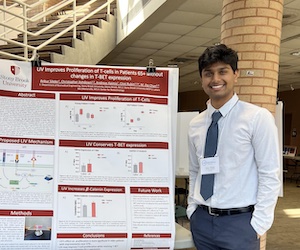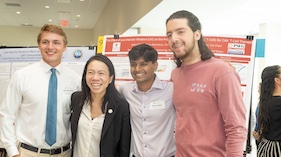Researcher of the Month
July 2024
 Ankur Sikder
Ankur Sikder
Major: Biochemistry; Class of 2026
Research Mentor: Dr. Mei Lin (Ete) Chan, Biomedical Engineering
Ankur Sikder is a Biochemistry major who has been deeply involved in undergraduate research at SBU since September of freshman year. What particularly sparked his research trajectory was a pivotal high school internship in summer 2021 at the Sadelain Lab at Memorial Sloan Kettering. There, Ankur developed expertise in wet laboratory techniques, worked on constructing plasmids for the engineering of CAR-T cells – and acquired a solid foundation for his future research under the mentorship of Dr. Mei Lin (Ete) Chan in the Department of Biomedical Engineering on how vibration treatment can improve CAR-T therapy.
Ankur enjoys the collaborative atmosphere of the Chan-Rubin laboratory which is doing exciting work on this promising cancer treatment and considers himself fortunate to have joined a laboratory early on that so well matches his research interests and allows him to pursue independent research projects. Devoting much of his time during the academic year as well as two summers to research, Ankur reflects: “The summer is probably the best time to just go full throttle on research. Coming in every day, you were able to really get in there and get things you needed to get done. That isn't really possible when you're taking classes for 20 hours a week…”
 Ankur participated in the 2023 Explorations in STEM summer program which culminated
with a Summer Symposium poster presentation on “The effects of LIV on CAR T-Cell exhaustion and proliferation.” Ankur also presented research posters on his work in the Chan-Rubin laboratory at
the Drexel Immune Modulation and Engineering Symposium in fall 2023, with support
from a URECA mini grant; and most recently at the SUNY Undergraduate Research Conference
at Suffolk County Community College (April 2024); and is continuing to do research
full time this summer. Ankur’s long-term plan is to apply to MD/Ph.D. programs involving graduate studies
in the field of bioengineering and immunology.
Ankur participated in the 2023 Explorations in STEM summer program which culminated
with a Summer Symposium poster presentation on “The effects of LIV on CAR T-Cell exhaustion and proliferation.” Ankur also presented research posters on his work in the Chan-Rubin laboratory at
the Drexel Immune Modulation and Engineering Symposium in fall 2023, with support
from a URECA mini grant; and most recently at the SUNY Undergraduate Research Conference
at Suffolk County Community College (April 2024); and is continuing to do research
full time this summer. Ankur’s long-term plan is to apply to MD/Ph.D. programs involving graduate studies
in the field of bioengineering and immunology.
On campus Ankur is involved as a peer tutor at the Academic Success & Tutoring Center/ASTC and Residential Tutoring Centers/RTC; he also is active in the Classical Guitar Club and the Biomedical Engineering Society/BMES. Ankur is a graduate of Coppell HS in Texas (northwest Dallas County). His hobbies include playing guitar, cooking and tutoring. Below are excerpts of his interview with Karen Kernan, URECA Director.
The Interview:
Karen: Tell me about your current research.
Ankur: I’m a member of the Chan-Rubin lab which has for a long time been working on how certain cells (bone cells) in the body react to vibration-- in particular, low intensity vibration which is characterized by a low amplitude and a low frequency. Something that we're focusing on now is in immune cells, such as T cells, to see if we can improve their functionality for certain cancer immunotherapies,
How did you first get started in the lab?
I’ve always loved research. And I had done a lot of research in high school. I had a summer internship during high school at Memorial Sloan Kettering, where we worked on cancer immunotherapies including a very powerful and promising therapy that reprograms a patient’s T-cells to target cancer called CAR-T Cell therapy.
So when I started as a freshman and was taking BME100, I met Dr. Chan, the course instructor who introduced herself and told us about what she was researching –including mechanosensitivity of T-cells for application in CAR-T therapy. So basically a week after my 1st class, I was visiting the lab and shortly after joined the lab in September of that freshman year. And the rest is history.
That worked out well!
I was very thankful. It usually takes a long time to find a good lab, but once I found one, I stuck with it and it’s been great!
What do you most enjoy about the research environment?
Something that I like is that I get to really be independent. Initially when you join a lab, you are closely supervised to make sure you are doing things properly. Over time though, I was able to design my own experiments and look at the things that I wanted to do. Beyond that, I also like that it’s both a biology and an engineering lab where it’s hands-on and you get to see the things you’re working with. I think that combination is something that I really enjoy.
How has being involved in research enhanced your educational experience overall?
The content that I've learned in lab has been helpful in some of my other classes, since we work with a couple of pathways that are important in biochemistry—such as the GSK3 beta (GSK3 β) pathway. But I think the biggest thing is that you don’t just learn the material on a surface level, or acquire knowledge based on what you can memorize. You get to really understand the why and the how. Research gives you an ability to probe deeper into content, and you can get a better understanding of what content is meant to be--something you can apply and remember for a long time to come.
Has there been anything that's really surprised you in the work that you've done in the lab?
Something that we found out is that T cells of older patients are actually much more receptive to our treatment than younger patients. Inherently that doesn't seem right. But as your cells age you can get back those younger phenotypes through vibration which I thought was amazing.
What was valuable about being in a summer program, such as Explorations in STEM?
The summer is probably the best time to just go full throttle on research. Coming in every day, you were able to really get in there and get things you needed to get done. That isn't really possible when you're taking classes for 20 hours a week.
But beyond that, I also got a lot out of the programs – such as the workshop on external scholarships. Even the RCR training was really helpful in knowing the bounds of what a researcher can and cannot do, as well as some of the safety things for sure. And I enjoyed presenting at the Summer Symposium.
I know you’ve also presented off campus too. Can you tell me a little bit about that experience?
Yes, I had the opportunity to present at a conference at Drexel, and just recently, I presented at SURC at Suffolk County. And I enjoyed both experiences.
The symposium at Drexel was an international engineering event – and I was actually the only undergrad there. I had the opportunity to get good critiques from other people in the field on what we could be doing better, or what we could be improved. And that helps us sort of move our work forward.
What advice would you give about undergraduate research?
The biggest thing I can say is, you get what you put in. In my first year I was coming into lab a lot, sometimes 30 hours a week… If I had work to do, I'd work in the lab. I would follow the grad student around until I really could understand what he was doing. I would read lots of papers just because of how much I enjoyed it. You have to put in the time and the effort. And make sure you choose a lab where you will have a good supportive group of people around you and also have fun! In the Rubin-Chan research group, we work hard, for sure. But you know, we have also fun!
